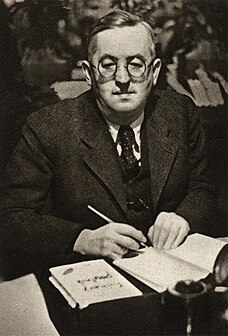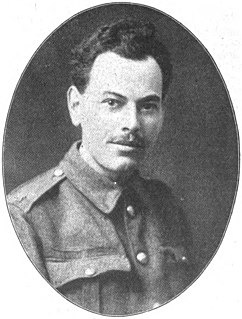This article needs additional citations for verification .(September 2014) |
Voyen Koreis, also Vojen Korejs (born 14 February 1943, London) was a Czech-Australian author, publicist, translator, visual artist, illustrator and designer.
Contents

This article needs additional citations for verification .(September 2014) |
Voyen Koreis, also Vojen Korejs (born 14 February 1943, London) was a Czech-Australian author, publicist, translator, visual artist, illustrator and designer.

Voyen Koreis was born at Pitt Street, near Kensington Palace in London. He passed away in his home in Brisbane on 16 June 2022. His father, Dalibor Korejs, was before the Second World War an employee of the Czechoslovak Foreign Ministry. During the war, as a Major of the Czechoslovak Army Abroad based in UK, he took part in several war missions in Africa and in Yugoslavia. In 1947-48 he was a trade attaché in Belgrade, in 1948 he was named Consul General in Berlin, where he died in 1950.
After his father's death Koreis lived with his mother Antonie Korejsová in Prague. In 1953 they moved to Rokytnice in the Giant Mountains. He attended the Grammar School in Jilemnice. In 1962 he commenced compulsory army service, and became a singer with the Army Entertainment Unit in Prague, where he met with a number of future personalities of the Czech cultural scene. After the army stint he moved to Karlovy Vary (Carlsbad), where he first worked as a stage hand in the town theatre, and later was active as a singer and actor with a cabaret group, before moving to Prague. He began to study operatic singing with Prof Jelena Holečková-Dolanská, intending to continue studying at the Prague Academy. However, after the invasion of Czechoslovakia by the Warsaw Pact Armies in 1968 he decided to move to Great Britain in 1969.
He changed the spelling of his name to Voyen Koreis, in order to make it more pronounceable for English speakers. With his Czech-born wife whom he had met in England, he migrated to Australia in 1973 and has since been living in Brisbane. In Australia he made a living first as a storeman, salesman, later as antiquarian bookseller, while also working for the government as interpreter and translator. He helped to found an ethnic radio station, where he had led the broadcasting in Czech, also moderating some English programmes. Koreis was also active as a journalist, as well as the station administrator, programming co-ordinator, vice-president and acting president. He also made a brief foray into the theatre, appearing as Ubu the King in the famous play by Alfred Jarry, at the Cement Box and La Boite theatres in Brisbane.
In Australia Koreis also became a visual artist, having held several one-man-shows as painter and ceramic sculptor. After the fall of the Communist regime in Czechoslovakia - soon to become the Czech Republic - he made several trips there, coming back with commissions for translating TV programmes, both into the Czech and English languages. This made him concentrate more on writing and translating. Koreis' short works, essays and columns, had begun to appear in the Czech Internet journals since 1996 and are still being published now. He has translated and published works by some Czech authors, including those of the brothers Josef and Karel Čapek, and has written several books in English. [1]
More recently Koreis has written mostly in Czech, concentrating mainly on esoteric subjects, and he has published several books, while also designing and maintaining web forums. He has also produced radio programmes for the Czech classical music station Vltava. Most of Voyen Koreis' works are available on the Internet, in traditional book form and as e-books.

R.U.R. is a 1920 science-fiction play by the Czech writer Karel Čapek. "R.U.R." stands for Rossumovi Univerzální Roboti. The play had its world premiere on 2 January 1921 in Hradec Králové; it introduced the word "robot" to the English language and to science fiction as a whole. R.U.R. soon became influential after its publication. By 1923 it had been translated into thirty languages. R.U.R. was successful in its time in Europe and North America. Čapek later took a different approach to the same theme in his 1936 novel War with the Newts, in which non-humans become a servant-class in human society.

Karel Čapek was a Czech writer, playwright and critic. He has become best known for his science fiction, including his novel War with the Newts (1936) and play R.U.R., which introduced the word robot. He also wrote many politically charged works dealing with the social turmoil of his time. Influenced by American pragmatic liberalism, he campaigned in favor of free expression and strongly opposed the rise of both fascism and communism in Europe.

Tomáš Garrigue Masaryk was a Czechoslovak politician, statesman, sociologist, and philosopher. Until 1914, he advocated restructuring the Austro-Hungarian Empire into a federal state. With the help of the Allied Powers, Masaryk gained independence for a Czechoslovak Republic as World War I ended in 1918. He co-founded Czechoslovakia together with Milan Rastislav Štefánik and Edvard Beneš and served as its first president.
The Czechs, or the Czech people, are a West Slavic ethnic group and a nation native to the Czech Republic in Central Europe, who share a common ancestry, culture, history, and the Czech language.

Josef Čapek was a Czech artist who was best known as a painter, but who was also noted as a writer and a poet. He invented the word "robot", which was introduced into literature by his brother, Karel Čapek.

Jan Švankmajer is a Czech retired filmmaker and artist whose work spans several media. He is a self-labeled surrealist known for his stop-motion animations and features, which have greatly influenced other artists such as Terry Gilliam, the Brothers Quay, and many others.

Karel Ančerl was a Czechoslovak conductor and composer, renowned especially for his performances of contemporary music and for his interpretations of music by Czech composers.

War with the Newts, also translated as Salamander Wars, is a 1936 satirical science fiction novel by Czech author Karel Čapek. It concerns the discovery in the Pacific of a sea-dwelling race, an intelligent breed of newts, who are initially enslaved and exploited. They acquire human knowledge and rebel, leading to a global war for supremacy. There are obvious similarities to Čapek's earlier R.U.R., but also some original themes.

Vladislav Vančura was an important Czech writer active in the 20th century, who was murdered by the Nazis. He was also active as a film director, playwright and screenwriter.

Arnošt Lustig was a renowned Czech Jewish author of novels, short stories, plays, and screenplays whose works have often involved the Holocaust.
Kytice z pověstí národních, also known by the short title Kytice, is a collection of ballads by the Czech author Karel Jaromír Erben. The collection was first published in 1853 and was originally made up of 12 poems. Lilie was added to the second edition in 1861.
Rudolf Margolius was a Czech politician. Deputy Minister for Foreign Trade, Czechoslovakia (1949–1952), and a co-defendant in the Slánský trial in November 1952.
Karel Šviha was a Czech politician in Austria-Hungary.

The theatre of the Czech Republic has a rich tradition in all genres, including drama, opera, ballet and dance, puppet theatre, black light theatre etc.

Olga Scheinpflugová was a Czech actress and writer. She was a daughter of the writer, journalist and playwright Karel Scheinpflug. In 1935, she married the writer Karel Čapek.
Marie and Robert Weatherall were a married couple who collaborated in translating the work of Karel Čapek into English.

(Percy) Paul Selver was an English writer and translator. A prolific translator of Czech literature into English, he was best known as the translator of Karel Čapek.

Národní listy was a Czech newspaper published in Prague from 1861 to 1941.

Pestrý týden was a Czech illustrated weekly magazine published November 2, 1926 to April 28, 1945, during the First and Second Czechoslovak Republics and during the Protectorate of Bohemia and Moravia. It helped establish top photo-reporters of the 1930s, such as Karel Hájek, Václav Jírů and Ladislav Sitenský. Published and printed by Grafické závody by Václav Neubert and Sons, based in Smíchov, Prague it was issued in 963 numbers.